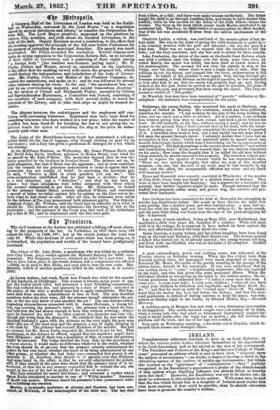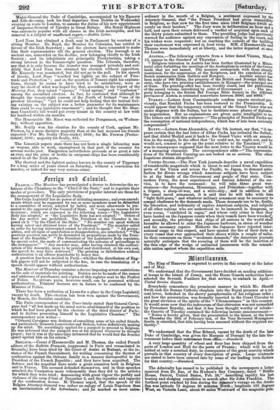IRELAND, Complimentary addresses continne to pour in on Lord Eglinton
; iii which the various public bodies felicitate themselves on his appointment to be Lord-Lieutenant and on his arrival at the seat of his government. " The President and Fellows of the King's and Queen's College of Physi- cians" presented an address which is said to have been " eloquent upon the subject of escutcheons,"—no doubt, in hopes of moving a chord in the chivalrous nature of the reviver of middle age tournaments ; but which also touched on the "grievance" of " centralization "—they " joyfully recognized in his Excellency's appointment a pledge of the abandonment of that system whose blighting influence has already fallen so heavily upon this land." However, his Excellency was not to be drawn out ; he made no reference to this subject in his answer. With some tact, he said that the ties which bound him to a daughter of Ireland must render him even more anxious, if that could be possible, than he should otherwise have been to promote the country's welfare. Major-General the Duke of Cambridge, accompanied by his Equerry and Aide-de-camp, took his final departure from Dublin on Wednesday evening en route to London, to assume the duties of his new appointment of Inspector-General of Cavalry in Great Britain. His Royal Highness was.extremely popular with all classes in the Irish metropolis, and his removal is a subject of unaffected regret.—Dublin Letter.
Lord Naas has obtained a fresh seat in Parliament by courtesy of a sitting Member. Dr. Boyd, the Member for Coleraine, has retired in favour of the Irish Secretary ; and the electors have consented to make him their representative till the general election. The borough is an ancient one, somewhat on the decline, now belonging chiefly to the Irish Society ; and its inhabitants are principally Presbyterians, taking a strong interest in the Tenant-right question. The Liberals, therefore, say that it is only because the transfer was managed privately and sud- denly that Lord Naas has obtained his election without opposition. Mr. Kennedy was nominated, but did not go to the poll. In his speech of thanks, Lord Naas "touched but lightly on the subject of Free- trade and Protection" ; and on the question of Tenant-right his explana- tions, though he seems to have tried to be satisfactory, were so very far short of what was hoped for, that, according to the report of the Morning Post, they raised " uproar," "loud uproar," and " confusion" among the assembled electors. In fact, he confessed that although he thought the tenant-right custom of the North of Ireland "one of its greatest blessings," "yet he could not help feeling that the mutual feel- ing existing on the subject was a better guarantee for its maintenance than could be any legislative enactment" ; and he thought that Mr. Shar- man Crawford's bill would put every tenant in the country at law with his landlord within six months.
The Honourable Mr. Knox was reelected for Dungannon, on Wednes- day, without opposition.
Mr. Scully won his election for the county of Cork, against Mr. Frewen, by a more decisive majority than at the last moment his friends expected—For Mr. Scully (Free-trader) 3956; for Mr. Frewen (Protec- tionist) 3105 ; majority for Scully, 851,
The Limerick papers state there bas not been a single labouring man or woman, able to work, unemployed in that part of the country for several weeks past. Emigration nevertheless proceeds at as great a rate as ever, and the price of berths in emigrant-ships has been considerably raised in all the Irish ports.
The shortest and the lightest assizes known in the county of Tipperary for a long series of years closed on Saturday, without a conviction for murder, or indeed for any very serious crime.



























 Previous page
Previous page